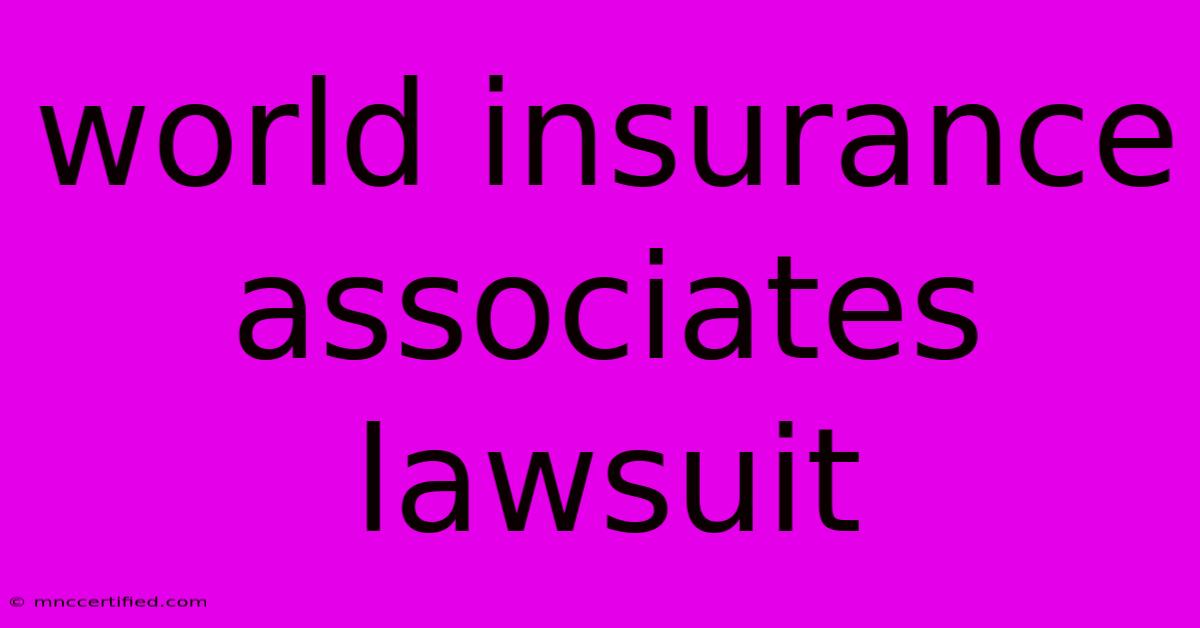World Insurance Associates Lawsuit

Table of Contents
World Insurance Associates Lawsuit: A Comprehensive Overview
The term "World Insurance Associates lawsuit" encompasses a range of legal actions against the insurance brokerage firm, World Insurance Associates LLC (WIA). These lawsuits stem from various alleged infractions, including but not limited to breach of contract, misrepresentation, and negligence. Understanding the specifics of these cases requires examining individual lawsuits and the allegations presented. This article provides a general overview, focusing on common themes and the potential implications for clients and the insurance industry. It's crucial to remember this information is for educational purposes and does not constitute legal advice. Always consult with a legal professional for guidance on specific legal matters.
Common Allegations in World Insurance Associates Lawsuits
While individual lawsuits vary in detail, several common themes emerge in allegations against WIA:
1. Breach of Contract:
Many lawsuits allege WIA breached contractual agreements with clients or other businesses. This could involve failing to provide promised services, improperly handling claims, or violating the terms of insurance policies. Understanding the specific contract is vital in these cases. Detailed examination of the contract's language and the alleged breaches is necessary to determine liability.
2. Misrepresentation and Fraud:
Some lawsuits accuse WIA of misrepresenting facts to clients, potentially leading to financial harm. This could involve misleading clients about policy coverage, premiums, or the suitability of specific insurance products. Proving fraudulent intent is a key challenge in these types of lawsuits. Evidence of deliberate deception or a pattern of misleading behavior is often required.
3. Negligence:
Allegations of negligence center on WIA's failure to exercise reasonable care in its professional duties. This could include neglecting to adequately research client needs, failing to procure appropriate insurance coverage, or mishandling claims processing. Demonstrating a duty of care, breach of that duty, causation, and damages are essential elements in proving negligence.
Types of Plaintiffs in WIA Lawsuits
Lawsuits against WIA involve diverse plaintiffs, including:
- Individual clients: These lawsuits often arise from disputes over insurance coverage, claims handling, or perceived misrepresentation of policy details.
- Businesses: Larger businesses may sue WIA for breach of contract, alleging failures in risk management or procurement of adequate insurance coverage.
- Other insurance companies: Lawsuits may involve disputes between WIA and other insurance companies concerning commissions, payment arrangements, or other business dealings.
Finding Information on Specific Lawsuits
Publicly accessible information on specific lawsuits against World Insurance Associates can often be found through:
- Court records: Many court systems maintain online databases allowing public access to case filings, including complaints, motions, and judgments. Searching by the company name ("World Insurance Associates LLC") and relevant keywords (e.g., "breach of contract") can yield results.
- Legal news websites: Specialized legal news websites frequently report on significant lawsuits and legal developments. Searching these sites for news related to WIA may provide relevant information.
- Securities and Exchange Commission (SEC) filings (if applicable): If WIA is a publicly traded company, SEC filings may contain information related to legal proceedings.
Impact on the Insurance Industry
The outcome of lawsuits against WIA could have broader implications for the insurance brokerage industry. Negative publicity and large settlements could impact consumer confidence and potentially lead to increased regulatory scrutiny of insurance brokerage practices.
Conclusion
The numerous lawsuits against World Insurance Associates highlight the importance of due diligence when choosing an insurance broker. Clients should thoroughly review policies, understand their coverage, and seek independent advice when necessary. The information presented here is for educational purposes only and should not be considered legal advice. Consult with a legal professional for personalized guidance on any legal matter.

Thank you for visiting our website wich cover about World Insurance Associates Lawsuit. We hope the information provided has been useful to you. Feel free to contact us if you have any questions or need further assistance. See you next time and dont miss to bookmark.
Featured Posts
-
Albirrojas 2 1 Victory Over Argentina
Nov 16, 2024
-
Billy Bob Thorntons Creative Motivations
Nov 16, 2024
-
Are Ear Tubes Covered By Insurance
Nov 16, 2024
-
Portugal Spain Scotland Win Nations League Matches
Nov 16, 2024
-
Breast Cancer Sarah Hardings Story
Nov 16, 2024